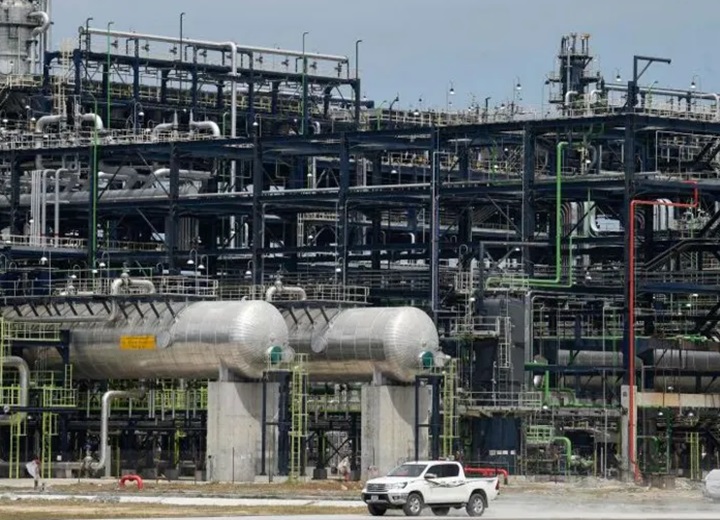In the deeply religious city of Kano in northern Nigeria, a unique prayer session was held a few months ago.
This gathering was organised to seek divine favour for the success of a significant industrial venture – the new Dangote Petroleum Refinery, which is set to start producing petrol next month.
While it might seem unusual to pray for an industrial facility, many Nigerians are hopeful that this $19 billion (£15 billion) refinery, located near Lagos on Nigeria’s southern coast, will drastically increase petrol availability and reduce prices.
Construction of the refinery, which spans nearly 4,000 football pitches, began in 2016. It started producing diesel and aviation fuel earlier this year, with petrol production scheduled to commence soon. The expectation is that this facility will end Nigeria’s dependency on imported fuels.

Despite being Africa’s largest crude oil producer and the world’s 15th largest, Nigeria’s government-owned refineries are non-operational. The privately owned Dangote refinery, built by Africa’s richest man, Aliko Dangote, represents a potential turning point. Born in Kano, the 67-year-old Dangote has amassed a fortune of $12.6 billion (£9.7 billion) through his Dangote Group, primarily in cement and sugar, before embarking on this ambitious project.
The prayer session in Kano was organised by local shop owner Lado Danladi at a nearby mosque, joined by fellow shopkeepers. “I run a small phone charging shop and spend $5 daily on petrol for my generator due to the lack of stable electricity,” Danladi explained. “Since hearing about the Dangote Refinery, I’ve been praying for its success. The refinery could end the fuel shortages and help small businesses like mine access affordable and reliable fuel.”
Danladi’s neighbours, including a meat seller and a drinks vendor, echoed similar frustrations over the high cost of generator fuel.
Historically, Nigerians benefitted from subsidised petrol prices, but these subsidies were halted last year by President Bola Tinubu, leading to a four-fold increase in prices. This spring and summer, petrol shortages led to long queues and warnings against panic buying from the Nigerian National Petroleum Company.
Corruption exacerbates the problem. Transparency International ranks Nigeria 145th out of 180 countries in its global corruption index, indicating a high level of corruption.
The Dangote refinery is designed to produce 650,000 barrels of fuel per day once fully operational. Devakumar Edwin, vice president of Dangote Group, stated that the refinery aims to produce 500,000 barrels daily by the end of August, surpassing Nigeria’s consumption of 480,000 barrels per day, with plans to export the surplus.
Abubakar Maigandi, president of Nigeria’s independent petrol marketers, believes the refinery will resolve longstanding logistical issues. “With the Dangote refinery, we can finally address the challenges of importing petrol. Refining locally will also mean cheaper petrol for Nigerians, as importation costs are eliminated. I hope the refinery deals directly with us, avoiding middlemen who complicate matters.”
Aliko Dangote mentioned in a 21 July interview with Premium Times that he might consider selling the refinery to the state-owned Nigerian National Petroleum Company (NNPC) in the future, acknowledging opposition to his ownership of such a crucial facility.
Nigerian public affairs analyst Sani Bala stresses that the refinery needs to significantly reduce petrol prices to make a tangible impact. “We shouldn’t rely solely on the Dangote refinery. Another operational refinery is essential as a backup. Additionally, the environmental impact of such a large refinery, including emissions and potential local community effects, must be considered.”
Local youth leader Arepo Azeez highlighted community concerns, such as vibrations from the refinery and the risks of accidental crude oil discharges and equipment mishandling leading to spills.
Despite these concerns, Lado Danladi in Kano eagerly anticipates the prospect of much cheaper petrol, hoping it will alleviate the daily struggles faced by small business owners across Nigeria.
Support InfoStride News' Credible Journalism: Only credible journalism can guarantee a fair, accountable and transparent society, including democracy and government. It involves a lot of efforts and money. We need your support. Click here to Donate
